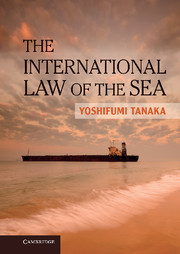Book contents
- Frontmatter
- Contents
- Preface
- Acknowledgements
- Figures
- Tables
- Abbreviations
- Table of Cases
- Table of Treaties and Instruments
- Part I The Divided Oceans: International Law Governing Jurisdictional Zones
- 1 The Law of the Sea in Perspective
- 2 Baselines and Related Issues
- 3 Marine Spaces under National Jurisdiction I: Territorial Sovereignty
- 4 Marine Spaces under National Jurisdiction II: Sovereign Rights
- 5 Marine Spaces beyond National Jurisdiction
- 6 Maritime Delimitation
- Part II Our Common Ocean: Protection of Community Interests at Sea
- Index
- References
1 - The Law of the Sea in Perspective
Main Issues
from Part I - The Divided Oceans: International Law Governing Jurisdictional Zones
- Frontmatter
- Contents
- Preface
- Acknowledgements
- Figures
- Tables
- Abbreviations
- Table of Cases
- Table of Treaties and Instruments
- Part I The Divided Oceans: International Law Governing Jurisdictional Zones
- 1 The Law of the Sea in Perspective
- 2 Baselines and Related Issues
- 3 Marine Spaces under National Jurisdiction I: Territorial Sovereignty
- 4 Marine Spaces under National Jurisdiction II: Sovereign Rights
- 5 Marine Spaces beyond National Jurisdiction
- 6 Maritime Delimitation
- Part II Our Common Ocean: Protection of Community Interests at Sea
- Index
- References
Summary
The international law of the sea is one of the oldest branches of public international law. Thus, it must be examined from the perspective of the development of international law in general. Originally the law of the sea consisted of a body of rules of customary law. Later on, these rules were progressively codified. The Third United Nations Conference on the Law of the Sea, which successfully adopted the United Nations Convention on the Law of the Sea (the LOSC) in 1982, is of particular importance in the codification of the law. Furthermore, the international community and the situations that surround the oceans are constantly changing. Accordingly, it is also necessary to examine the evolutionary process of the law after the adoption of the LOSC. As a general introduction, this chapter will address the following issues in particular:
What are the principal functions of the law of the sea?
What are the sources of the law of the sea?
What are the principles governing the law of the sea?
What are the specific procedures of the Third United Nations Conference on the Law of the Sea?
What are the principal features of the LOSC?
What is the evolutionary process of the LOSC and the law of the sea?
General considerations
Historically, the oceans have been and continue to be fundamental to human life. The ever-increasing use of the oceans necessitates international rules governing various human activities in the oceans. The body of international rules that bind States and other subjects of international law in their marine affairs is called the international law of the sea. Like the international law of armed conflict and the law of diplomacy, the law of the sea is one of the oldest branches of public international law. Furthermore, like international human rights law and international environmental law, the law of the sea is a dynamic field of international law. The law of the sea can be said to mirror both classical and novel aspects of international law. Thus the law of the sea must be studied from the perspective of the development of public international law as a whole.
- Type
- Chapter
- Information
- The International Law of the Sea , pp. 3 - 42Publisher: Cambridge University PressPrint publication year: 2012



